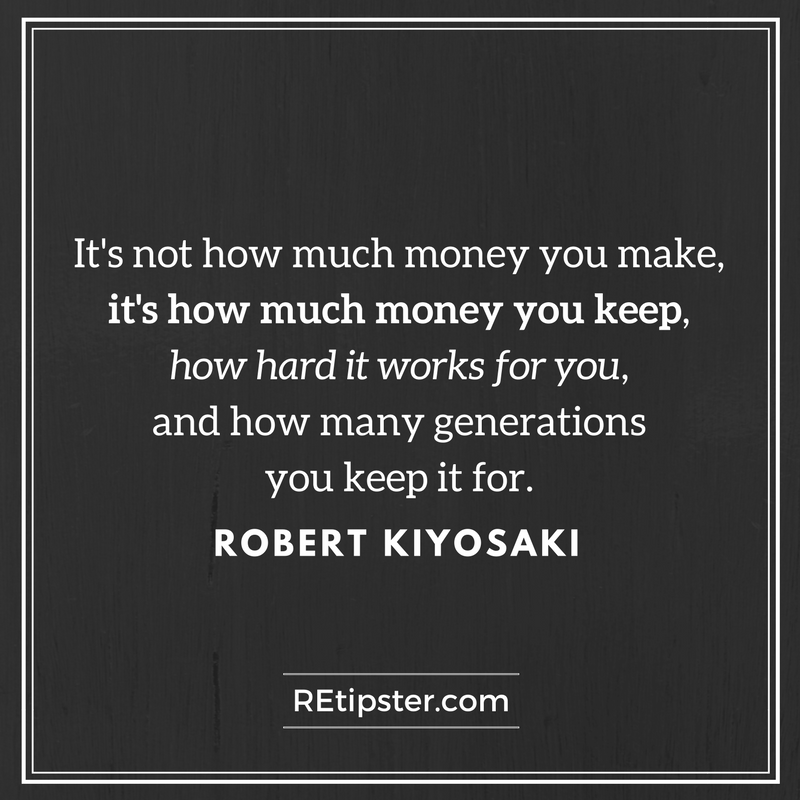 Today I wanted to cover some real estate investing 101 material that I think a lot of people need a refresher on.
Today I wanted to cover some real estate investing 101 material that I think a lot of people need a refresher on.
Most of these things are fairly “entry-level” in nature, and most of us probably already understand and agree with them. But for one reason or another, these concepts tend to get lost in the shuffle of our daily lives. As a result, people break these rules all the time (including me, believe it or not).
Whenever human emotion comes into play, a lot of people start doing some really dumb things. After all, emotions have never been the best decision-maker. None of us are immune to it, so as a way to combat this kind of behavior, I thought it would be wise to establish some ground rules.
As we dive in, I want you to ask yourself—do you agree with this stuff? If so, are you actually following these principles?
1. Don't Gamble Your Way Into New Properties.
A lot of people have this idea that if they just buy a property—ANY property—it will somehow make them wealthier. They don't bother to run the numbers and thoroughly understand where their information is coming from. They fail to scrutinize whether the data is accurate and reliable. And when you fail to do these things, your investment decision becomes more a matter of gambling than investing.

As with anything in life, you need to know what you're looking for exactly. And when an investment opportunity doesn't fit inside the box (which is almost always the case, by the way), you need to say “No” and continue searching for that diamond in the rough.
RELATED: The Beginner's Guide to Buying Rental Properties (A Case Study)
2. Don't Pay for Things That Don't Add Value.
Don't get me wrong—there are many times when it is very much worth your while to pay for improvements to your real estate or pay for a service that will add value to your business. These things can help your operation run smoother and grow. They can also allow your properties to generate more revenue with a shorter turnaround, both of which will be important to the long-term health of your investment portfolio.
On the same coin, MANY temptations constantly entice you to spend your hard-earned money on things that look flashy and appealing. Unfortunately, none of these add anything to your bottom line.
Use great discernment with the things you spend your money on—especially in the beginning when money isn't “growing on trees.” Accept the fact that you're never going to get everything you want. Choose your battles wisely and only invest your cash in the things that will actually bring your business to the next level.
3. Don't Start Spending Your Investment Returns Until You Can Actually Afford to LIVE Off Them.

But the funny thing about freedom is, freedom isn't free. You need to invest the time, effort, and blood, sweat, and tears required to get there. I've encountered more than a few hopeful investors on the right track; they were doing everything right, but they pulled the plug on their day job WAY too soon.
I get it! Everybody desperately wants to start enjoying the fruits of their labor. But the kicker is, the minute you start siphoning off your real estate income to finance your life, the growth of your real estate portfolio will slow WAY, way down—if it doesn't just grind to a halt altogether.
Now, this isn't necessarily a bad thing; it's just the price of freedom. Wherever your real estate investment portfolio is at (even if it's non-existent), it will slow down significantly (or stop) the minute you start living off of it. So it's important not to make this jump until you're actually able to start living the life you want from the income generated by your properties.
What's the point of “retiring” if you can't live the life you want? You're essentially just trading one huge inconvenience (e.g., a job) for another huge inconvenience (e.g., a severe lack of income to support your desired lifestyle). I'm not saying your investments need to throw off a TON of money, but it should create enough to support the life you want (whatever that happens to look like).
RELATED: The Surprisingly Simple Math to Retiring on Real Estate
4. Got Extra Cash? Invest It!
Have you ever gotten a bonus at work? Ever been lucky enough to receive a large financial gift? Ever inherited some life insurance proceeds or just been disciplined enough to build up enough savings to do something substantial?
Most of us live life with the mindset that money is made to be spent. I've actually struggled with this quite a bit in my life. Cash used to have a way of burning a hole in my pocket UNLESS I have a very specific financial goal that I'm working toward (i.e., buying a new property).
Knowing that this kind of temptation is a problem for me, I always have the ongoing goal of saving up enough cash to buy my next rental property. Why? Because every little “doodad” that I waste my money on is nothing more than a financial setback to reaching my actual goal of financial freedom.
And let's be honest, it's not that you CAN'T buy fun things in life. You just need to buy the income-generating assets first and LET THEM pay for the fun things you want out of life.
5. Don't Buy Properties That Cost More Than They Make.
Again, I know this one probably sounds obvious, but people break this rule all day long. And they usually make this error because:
- They aren't paying attention to the data that matters.
- They aren't using the right data (from reliable sources).
- They have no idea how to evaluate a property in the first place.
Let's face it—for a property to be an actual “investment,” it needs to generate a profit.

An endless number of things can (and will) eat away at your revenue and become obstacles to you making (and keeping) your money. If you want to avoid the trap of owning a property that costs more than it makes, be sure to do thorough due diligence before you buy it and leave no stone unturned in the process. Believe me; it may be tedious work that requires great patience, but when you lay the groundwork properly, you'll thank yourself for a lifetime!
RELATED: Real Estate Basics: How Rental Properties Make Money
6. Be Fearful When Others Are Greedy and Greedy When Others Are Fearful.
Real estate investing is one of those games where it's surprisingly easy to get caught up in your market's “herd mentality.”
When I first got into real estate investing, the entire U.S. market was headed into one of the worst recessions in history. My first four years of investing were in a world where real estate was cheap, easy to get, and it was always a buyer's market.
So far, the nationwide real estate market has turned around dramatically. There is virtually NO excess inventory of real estate on the market, most properties are selling in a matter of days (not years), and people have a wildly different view of real estate than they did just 24 months ago.

A smart real estate investor needs to have enough discernment to understand when a deal is actually a deal. It has nothing to do with what your realtor tells you, it has nothing to do with what the seller tells you, and it has nothing to do with public opinion.
It has everything to do with your ability to evaluate every aspect of a property for what it is.
- How much revenue will it generate?
- How much is it going to cost you?
- At what price does this property actually make sense to purchase?
As simple as these questions may appear, the actual, factual answers usually aren't going to be obvious. It will take some substantial “digging” to find the right information. I've found that, in most cases, when someone is trying to feed me this information (as though the answers should be obvious), they're usually trying to sell me something.
7. Put Your Monthly Bills and Deposits on Autopilot.
Something I finally figured out a few years ago was that I needed to automate the heck out of my business. This meant changing a lot of things. One of the first (and easiest) changes to implement was simply putting my monthly bills and deposits on autopilot.
This means that when I get a cell phone bill, a mortgage bill, a utility bill, or ANY monthly bill for that matter, I'm not wasting my time writing a check and mailing it back to the service provider. I don't even want to log in to some online account to pay it. I want these bills to get paid automatically—without requiring one extra second out of my already busy day.
It also means that when a tenant, borrower, or buyer sends me a check in the mail, I'm not driving to the bank to deposit it. In most cases, I'm not even whipping out my phone for a mobile deposit. Instead, I've set things up so my monthly revenues are also automatically deposited into my checking account without having to needlessly go through extra steps each time I make money.
Implementing these rules has saved me (and continues to save me) countless hours. If you aren't doing the same thing, you're acting like a bottleneck in your business. As a result, you're wasting a lot of hours that you could be using to further your business and/or simply enjoy your life!
8. Don't Hesitate to Pay for the Right Expertise.
I've heard an endless number of lame excuses as to why people insist on managing their own rental properties.
I know all kinds of people who had refused to hire a realtor or pay for more exposure when they legitimately needed help selling their property.
I know even more people who adamantly refuse to hire attorneys, even when they desperately need legal help.

I'm not saying their excuses are WRONG. Every situation is unique, and sometimes a job actually does require some hands-on attention. But there are WAY too many people who have trained themselves to respond with a knee-jerk “NO” response when it comes to paying for the right help.
Think about it:
- Do you take your car to a mechanic when it needs fixing?
- Have you ever gone to a doctor when you're sick?
- Have you ever paid a plumber, electrician, carpenter, or any other subcontractor to repair or upgrade one of your properties?
I do these things all the time! Why? Because I don't have the right skill set to do it myself.
RELATED: Outsourcing Your Way To Success
There are MANY instances where you will be in this same situation with your real estate investing business. When this happens, it's in your best interests to hire someone who can help you better than you can help yourself.
The only trick is to know when it's worth your money to pay for outside expertise. Personally, I like to use Chris Ducker's 3 qualifying questions to figure out what sort of help I should be paying for:
What activities do you HATE doing?
Let's just start out by acknowledging the downright painful things for you to do (i.e., activities that feel like you're slowly being tortured to death). You may be capable of doing it, and it might even be something that needs to be done. But if you HATE doing it, you probably need to come up with a Plan B.
Why a Plan B? Because if you continually force these things upon yourself, it's just a matter of time until you burn yourself out. And practically speaking, if there's a feasible and effective way to have someone else do it, why would you not steer things in that direction?
What activities are you INCAPABLE of doing?
Believe me—I have a LONG list of these things. Whether it's performing SEO work on my website or renovating one of my rental properties (two examples of things I have no idea how to do), there is an endless number of things that just aren't going to get done if it's left up to me. Nevertheless, these things are still important; they need to get done.
Take a few minutes to nail down the things in your business that require the help of a professional. Don't be bashful about it. If these things are important and need to be done, but you can't do it yourself, what are you waiting for? Find the right help and start getting those important jobs done!
What activities SHOULDN'T you be doing?
Are there any daily rituals or activities that you waste an inordinate amount of your time on? Think about the things you do that don't seem to add any actual, quantifiable “value” to your business operation. Do these things even need to be done? What were you hoping to accomplish in the first place?
If you discover activities that just aren't necessary—then stop! If you discover vaguely important activities in spite of far more important things deserving of your time, bingo! They are things you should consider outsourcing.
RELATED: How to Juggle Your Real Estate Business With a Full-Time Job
The bottom line is, you need to pick your battles. You're only one person, and you have a finite amount of time to accomplish the things you need to do every day. So think long and hard about which activities you NEED to be intimately involved with. If you're honest about it, there should be plenty of things that don't fit onto your “to-do” list. Then, once you figure out what these things are, get rid of them or outsource them.










